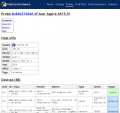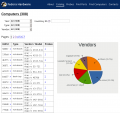(→Usage) |
|||
| Line 11: | Line 11: | ||
== Usage == | == Usage == | ||
Submit your hardware: | |||
# hw-probe -all -upload | # hw-probe -all -upload | ||
Output: | |||
Probe for hardware ... Ok | |||
Reading logs ... Ok | |||
Uploaded to DB, Thank you! | |||
Probe URL: https://linux-hardware.org/?probe=c84b37d646 | |||
Decode ACPI tables (requires ''acpica'' package): | Decode ACPI tables (requires ''acpica'' package): | ||
| Line 26: | Line 33: | ||
# hw-probe -import ./Directory_to_save_index | # hw-probe -import ./Directory_to_save_index | ||
<gallery> | |||
Fedora1.png|A probe | |||
Fedora3.png|Index of tested computers | |||
Fedora2.png|List of probes | |||
</gallery> | |||
== Reports backup == | == Reports backup == | ||
Revision as of 06:23, 13 August 2019
About
The Fedora Hardware Database is automatically created based on hardware probes collected by hw-probe RPM package or by this flatpak.
It is a part of the global Linux Hardware Database, the successor of Smolt project.
Installation
# dnf install hw-probe
Usage
Submit your hardware:
# hw-probe -all -upload
Output:
Probe for hardware ... Ok Reading logs ... Ok Uploaded to DB, Thank you! Probe URL: https://linux-hardware.org/?probe=c84b37d646
Decode ACPI tables (requires acpica package):
# hw-probe -all -upload -decode-acpi
Perform simple graphics tests (requires mesa-demos package):
# hw-probe -all -upload -check
Import created probes to a local directory:
# hw-probe -import ./Directory_to_save_index
-
A probe
-
Index of tested computers
-
List of probes
Reports backup
All collected reports are anonymized and dumped to this Github repository: https://github.com/linuxhw/
Statistics
By creating a hardware probe you contribute to the "HDD/SSD Real-Life Reliability Test" and "Devices with poor Linux-compatibility" studies.
Privacy
Private info is not collected. See privacy notes.



